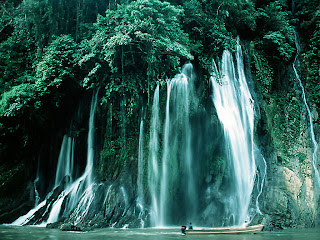Waterfalls are commonly formed when a river is young. At these times the channel is often narrow and deep. When the river courses over resistant bedrock, erosion happens slowly, while downstream the erosion occurs more rapidly. As the watercourse increases its velocity at the edge of the waterfall, it plucks material from the riverbed. Whirlpools created in the turbulence as well as sand and stones carried by the watercourse increase the erosion capacity. This causes the waterfall to carve deeper into the bed and to recede upstream. Often over time, the waterfall will recede back to form a canyon or gorge downstream as it recedes upstream, and it will carve deeper into the ridge above it. The rate of retreat for a waterfall can be as high as one and half meters per year.
skip to main |
skip to sidebar
Search
menu
-
▼
2011
(81)
-
▼
noviembre
(31)
- Forest
- Hyenas
- Black Mamba
- The King Cobra
- Funny Photos
- Capybara
- Giraffe
- Eagles
- Zebra
- Elephants
- SOCCER SAQ soccer bag with ball compartment
- Wags at the World Cup
- Franklin Sports Disney Pixar Toy Story Size 3 Air ...
- Wallpaper
- Fox
- Wolf
- Gepards
- Tigers
- Leones
- Niagara Falls
- Waterfalls
- Anaconda
- Ocean Life
- Sunset
- The Congo River
- The Amazon River
- The Nile River
- The Sahara Desert
- Animal
- Lizards
- Snakes
-
▼
noviembre
(31)
































